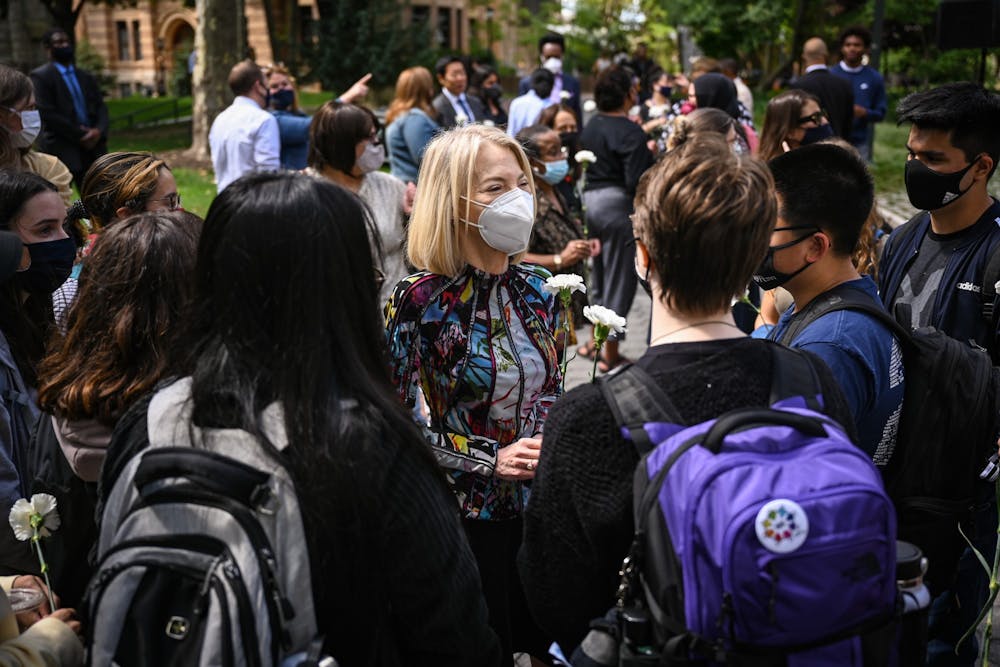
When I first heard the news that Penn President Amy Gutmann, more affectionately known by students as “Amy G,” would be leaving Penn, I was surprised. I was also saddened, as one might expect to feel when a longtime friend is telling you they are moving away. In discussing the news and my emotions attached to it with my friends who attend other institutions over Thanksgiving break, I was met with perplexed looks. Apparently, it was uncommon to feel strongly — or have an opinion at all, rather — about a university president’s departure. That’s when I realized, Amy Gutmann is no common university president.
My first interaction with Gutmann came in the fall of my first year at Penn. As a student in the Class of 2024, I was starting college virtually; so, like many other first years across the country, I joined campus groups like The Daily Pennsylvanian to both meet other students and feel as though I was contributing to the overall culture of our school. 2020 was also a major election year, and as a first-time voter, I had thoughts. This led me to publish my first DP column in which I encouraged my fellow classmates to get out to vote.
The day after the article was published, I was shocked to see an email from Gutmann waiting for me in my inbox, double-checking the email address and reading “president@upenn.edu.” In the email, she commended me on the column and wished me well in the upcoming semester. After the initial surprise wore off, I couldn’t help but feel an overwhelming sense of gratitude. If I didn't feel like a Penn student before, due to the virtual nature of things, a personal welcome from my university’s president sure made me feel like one now.
That incident might’ve seemed like a one-off to my first-year self. But as fate would have it, we met in person one year later at an Undergraduate Assembly cabinet meeting, this time on Election Day 2021. Though it had been an entire year since I wrote my piece on voting, upon introducing myself to Gutmann at the meeting, she once again spoke on the article’s importance. But it was something she said later in the meeting that particularly stuck with me. In discussing how her departure could potentially stall the progress of both UA and University projects, she remarked that as long as she was in the position of president, supporting the work of the University would continue to be her utmost priority, regardless of her Senate appointment proceedings or the end of her contractual term, and that her fellow administrators should act in the same regard.
Like any university administrator, however, her term has not been without frustration on the part of students — myself included — at the decentralized and slow-moving nature at Penn that plagues perennial campus issues like prioritizing our cultural centers. It can be easy to mistake this as complacency, as I first did, but behind each of Gutmann’s decisions is a genuine concern for the impact it will have on students, which may mean taking longer to get right. In fact, most of what I’ve written this far will not come as a surprise to many Penn students. Having had the opportunity to walk and talk with her down Locust Walk recently, I watched firsthand as she stopped for every club when they called out “Yo, Amy G,” posing for group pictures and making conversation with vocal groups about her questionable attempts at singing in the past. She was visible, present, and real, and that matters to students.
When I was first tasked with writing about Gutmann’s legacy at Penn, I thought I might write about the billions of dollars she has raised for the University over her tenure in the position. However, quoting dollar amounts would not be a fair representation of her success because Gutmann views her own success in the successes of her students. And that, well that’s what makes Gutmann no common university president.
ALEX EAPEN is a sophomore in the College from Elkridge, Md. His email is aeapen@sas.upenn.edu.
The Daily Pennsylvanian is an independent, student-run newspaper. Please consider making a donation to support the coverage that shapes the University. Your generosity ensures a future of strong journalism at Penn.
Donate






